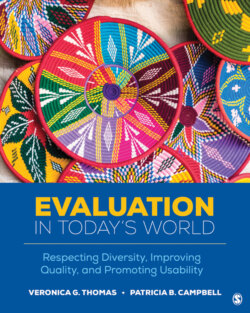Читать книгу Evaluation in Today’s World - Veronica G. Thomas - Страница 165
На сайте Литреса книга снята с продажи.
21st-Century Evaluation: Expanding the Focus
ОглавлениеAt the start of the 21st century, evaluation was in a boom period with increasing diversity in theoretical and methodological options available to evaluators. Stufflebeam and Coryn (2014, p. 39) referred to the period of 2005–2014 as the “age of global and multi disciplinary expansion” with several characteristics: (a) over 50 professional evaluation societies throughout the world, (b) a growing evaluation profession encompassing a wide range of disciplines and evaluators from various disciplinary perspectives and backgrounds who are increasingly exchanging information, (c) studying in interdisciplinary degree programs, (c) more collaboration on evaluation projects and publications, and (d) meeting together in broadly focused evaluation conventions and meetings. With Congress under increased pressure to balance the federal budget, new calls for accountability resulted in an escalating demand on social programs to demonstrate their worth. Evaluation in the 21st century can be described, in part, as a profession and practice influenced by the strengthened legislation for evaluation at the federal level; expansion of evaluation approaches, paradigms, and methodologies; and increased emphasis on social justice and diversity.
The new millennium began with a vision of (large- and small-scale) evaluations taking place in a wide range of settings with more diverse evaluators (or evaluation teams) than in earlier decades. There was greater buy-in across various audiences of the value of evaluation, in part, due to the increasing demand of funders for evidence of program process and outcomes. There were also calls for evaluation to more accurately represent the voices of the less powerful and marginalized in an increasingly diverse society and a changing political and policy context. There was an expansion of capacity-building efforts, particularly in relation to increasing the pipeline for more ethnically diverse evaluators. The 21st century also began with greater respect for methodological diversity—that is, being more inclusive in the types of methods and approaches needed to establish rigor and credibility. There was increased focus on expanding evaluation use and limiting misuse. These, and other issues, are discussed in the following sections.
Table 3.4 highlights some key evaluation-related events and people of the 21st century. Similar to Table 3.2 reflecting significant issues in the 20th century, Table 3.4 also includes events and people not limited to specific evaluation studies or evaluators, per se, but highlights specific individuals and activities that contribute to the current thinking in evaluation scholarship, methodology, and practice.
Table 3.4
